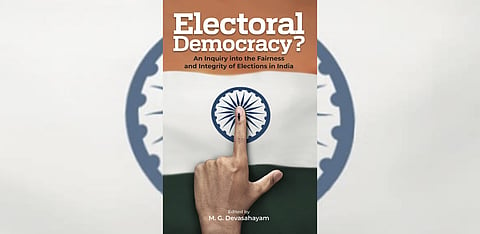

THE former Chief Election Commissioner, T.S.Krishna Murthy once summed up the ills of India's electoral democracy in terms of two Weapons of Mass Destruction (WMDs): money power and muscle power. In today's context, however, he may find that the list of WMDs may have to be expanded to include Electronic Voting Machines (EVMs)-VVPAT (Voter Verified Paper Audit Trail), Aadhaar-voter ID linkage, and an Election Commission whose credibility as an independent institution has suffered a serious setback, with its actions and inactions hugely favouring the ruling party at the Centre.
The title of the book under review with a question mark may sound pessimistic about the future of Indian democracy. But the signs are ominous, and unless we, as a body politic, take timely corrective steps, the damage to the democratic fabric may be irreversible.
This book is a result of depositions before the Citizens' Commission on Elections, set up after the 2019 Lok Sabha elections. As Justice Madan B.Lokur, Chairman, CCE, and Wajahat Habibullah, Vice-Chairman, CCE note in their Foreword, the Election Commission neither responded to serious concerns about the way the Model Code of Conduct was violated with impunity, nor sought to defend itself when patent infirmities were pointed out by responsible citizens.
The first section of the book deals with the merits of EVMs and VVPATs. Justice Lokur and Habibullah assert that voting procedure should be easily comprehensible and verifiable by the voter and open to audit without complications, and not concealed by the application of the relevant technology. "There can be no compromise in allowing for error or misrepresentation of the elector's choice for, in our view, that would be a compromise with the essence of India's democracy and therefore, suborn our Constitution", they say in their Foreword to the book.
As the year draws to a close, we find that the EVMs have raised a fresh controversy, not envisaged in the book: EC's decision to introduce a prototype of the remote electronic voting machine for domestic migrant voters. The opposition has expressed concern that it would undermine trust in the elections.
The book voices the concern that though a VVPAT is installed in every EVM, not even a paper slip is counted and matched to verify/audit the votes polled and votes counted before making the results public. "Due to the absence of end-to-end (E2E) verifiability, the present EVM system is not verifiable, and therefore is unfit for democratic elections", the book observes.
In the second section, the book has chapters on the electoral roll, and exclusion of vulnerable sections from voting, criminalisation and money power, role of the media and E.C. 's partisan and controversial functioning.
In the third section, the book has special articles on the assembly elections in 2021 assembly elections in West Bengal, and Tamil Nadu 2020 assembly elections in Bihar.
The former Chief Election Commissioner, S.Y.Quraishi's article, 'Putting the Election Commission and the Elections Back on the Rail', among other things, suggests appointment of the Election Commissioners through the collegium, and of the CEC, based on seniority. Quraishi also suggests a ceiling on expenditure by political parties, abolition of electoral bonds, and if it is not feasible, at least disclosure of the names of the donor and the recipient, apart from extending the right to vote to prisoners.
As Quraishi observes, India's rank in every global index of democracy is going down steeply: it is imperative to sit up, introspect and put the sliding giant back on the rail.